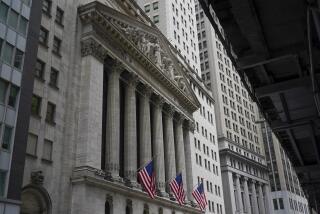Merger Mania Keeps a Record Pace
Despite recent market turmoil, the volume of U.S. mergers and acquisitions continued at record levels in the third quarter with a wave of all-cash deals that boosted 1998 activity past the $1-trillion mark, the largest annual merger volume in U.S. history.
For the quarter, there was $327.7 billion in announced deals nationwide, a 70% increase from the third quarter of last year, when there was $192.3 billion in deals, according to Securities Data Co., a New Jersey-based data-tracking service.
All-cash offers played an increasingly dominant role in these deals, as market volatility pushed down the prices of many companies’ stocks and nearly froze the merger market in September.
For the quarter ended Wednesday, 48.2% of mergers and acquisitions announced were for cash--as opposed to stock or debt--the highest proportion since 1988, when 56% of deals were cash, according to Mergerstat, a data service owned by Houlihan, Lokey, Howard & Zukin, a Los Angeles investment banking firm. In the second quarter, only 39% of deals were for cash, according to Mergerstat.
“This is the highest level of cash deals since the 1980s, and I suspect it will continue to be strong in the fourth quarter,” said Bill Clark, chief operating officer of Mergerstat.
“While there was a reduction of mega-mergers at the end of the third quarter,” Clark said, “there is still a lot of momentum in the merger market for mid-sized companies.”
This year’s historic level of mergers has topped 1997’s all-time record of $911 billion worth of deals, according to Securities Data.
For the year to date, there have been 11,797 announced mergers with a total value of $1.28 trillion, Securities Data said.
Still, some merger specialists are predicting that the recent market volatility that virtually froze merger activity in September will mean a slowdown in mergers during the last quarter of 1998.
It could also further boost the amount of deals done with cash, now that so many companies have seen their stock prices drop to low levels, making it financially unwise to use stock as currency.
In addition, the volatility could fuel an increase in hostile takeovers, say some Wall Street investment bankers and lawyers working on such deals.
“Still, most M&A; professionals are starting to worry how it’s going to shake out next year. When the stock market takes a big hit, companies are reluctant to sell at depressed prices,” said Robert A. Kindler, a New York attorney with Cravath, Swaine & Moore who specializes in mergers.
The merger boom this year, as in recent years, has been fueled by many American companies’ desire to form strategic alliances designed to increase efficiency through size, boost shareholder value and create entities that can better compete in the global marketplace of the next century.
Most 1990s deals have been friendly mergers paid for with stock or cash, as opposed to the hostile junk-bond-driven, debt-laden deals that were common in the 1980s.
Eight of the 10 largest merger deals in U.S. history have been announced in 1998, including one in the third quarter--Bell Atlantic Corp.’s deal with GTE Corp., valued at $66.6 billion.
Earlier this year, there was the $70-billion (original value) deal between Citicorp and Travelers Group Inc., the $61.4-billion deal between Ameritech Corp. and SBC Communications Inc. and the $63-billion deal between BankAmerica Corp. and NationsBank Corp.
More to Read
Inside the business of entertainment
The Wide Shot brings you news, analysis and insights on everything from streaming wars to production — and what it all means for the future.
You may occasionally receive promotional content from the Los Angeles Times.










